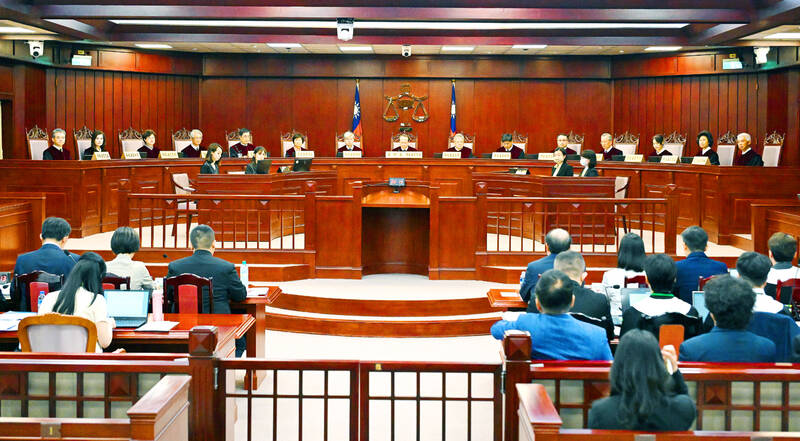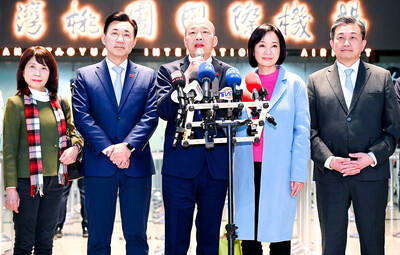The Constitutional Court is on Aug. 6 to hear oral arguments on executive oversight amendments passed by opposition Chinese Nationalist Party (KMT) and Taiwan People’s Party (TPP) lawmakers and opposed by the ruling Democratic Progressive Party (DPP).
After the amendments became law on June 26, separate requests for a judicial ruling were filed by President William Lai (賴清德) as well as the Executive Yuan, the Control Yuan and the DPP’s legislative caucus.
Before ruling on the amendments’ constitutionality, the court would consider whether to approve an injunction blocking their enforcement. Attorneys and legal academics representing the DPP-affiliated petitioners, and surrogates selected by the KMT and TPP caucuses presented competing arguments at a preparatory hearing on the matter yesterday.

Photo: Liao Chen-huei, Taipei Times
Q1: What would be the main disputes in the Constitutional Court’s review of the case?
The court is tasked with determining whether the deliberation that led up to the amendments’ passage contained “palpable” and “sufficient” defects, as defined by the 1994 ruling on the legislative process of the Organic Act of the National Security Council (國安會組織法, Interpretation No. 342).
The Constitutional Court will also rule on whether the updated laws approved by the legislature on May 28 contravene the Constitution.
The revisions give the legislature new investigative powers, including the power to hold hearings, with public officials subject to fines and jail time if they refuse to attend hearings or provide information, or if they present false information.
The amendments also include provisions requiring the president to deliver an annual “state of the nation” address at the legislature and then field questions from the floor.
Q2: Why have different agencies petitioned the Constitutional Court?
In a rarity, the three top government agencies, all headed by DPP officials, have joined the party’s legislative caucus in seeking a judicial ruling.
Lyu Jheng-yan (呂政諺), head of the Judicial Reform Foundation’s Law and Policy Department, said it was mainly because the four parties were affected by different provisions in the amendments, and they hence petitioned the court separately based on their needs.
For example, the Control Yuan would contend the measures granting the Legislative Yuan extra powers would usurp its constitutionally bestowed investigative powers, he said.
Soochow University Department of Political Science academic Su Tzu-chiao (蘇子喬) said that the overlapping legal filings, which he described as “a barrage of arrows,” reflected the DPP’s intent to bolster its arguments that there were “serious violations of the Constitution.”
Q3: Is it constitutional for the Cabinet to take legal action after the legislature voted on June 21 to uphold the amendments sent for reconsideration?
Some, including KMT Chairman Eric Chu (朱立倫), have questioned the Cabinet’s decision, arguing that Premier Cho Jung-tai (卓榮泰) “should immediately accept” the amendments following the June 21 vote, as per the Additional Articles of the Constitution.
However, Cabinet spokesman Chen Shih-kai (陳世凱) on June 27 told a news briefing that requesting the legislature’s reconsideration of the bills and seeking a constitutional ruling on the amendments were “two different constitutional procedures.”
The Cabinet had attempted to stop the amendments’ implementation by asking the legislature to vote on them once again, but the opposition lawmakers, who together hold a majority of seats, voted down the request on June 21.
According to the procedure, Lai signed the bills into law on June 24.
Lyu holds the same view as the Cabinet spokesman, adding that the executive body had petitioned with Article 47 of the Constitutional Court Procedure Act (憲法訴訟法) serving as its legal basis.
However, such a move by the Cabinet is unprecedented.
The Constitutional Court has only intervened twice to resolve disputes between the Cabinet and the legislature over laws passed by the latter, following lawmakers’ rejection of the Cabinet’s request for reconsideration of those laws.
These two instances were brought about by the passage of the Referendum Act (公民投票法) in 2003 and that of a special act to form a task force to investigate the assassination attempt on then-president Chen Shui-bian (陳水扁) of the DPP on March 19, 2004.
In both cases, it was the DPP legislative caucus that moved forward to seek a ruling on the constitutionality of the laws passed by a hung legislature.
Q4: How long would the Constitutional Court take to reach a ruling and would it be final?
The court should make a ruling within three months after the conclusion of oral arguments, but this deadline can be pushed back by two months if necessary, the Constitutional Court Procedure Act (憲法訴訟法) states.
For the amendments to be annulled, the case must be reviewed and approved in a majority decision by at least two-thirds of sitting justices.
Lyu said that justices might expedite the review of the disputes, given their “highly contentious” nature.
In the case of the Legislative Yuan’s initiative to probe the assassination attempt on Chen Shui-bian, a ruling (Interpretation No. 585) was handed down three months after the DPP legislative caucus filed its petition, Lu said.
In another case, which concerned mandatory fingerprinting for issuing ID cards, an injunction was granted 10 days after the court received the DPP caucus’ application, with a ruling (Interpretation No. 603) rendered approximately four months later, he said.
Su said justices would rule on the oversight laws case in about three months.
The 2000 case about ceasing the construction of the Fourth Nuclear Power Plant in Gongliao District (貢寮), New Taipei City, took the court less than three months to reach a ruling (Interpretation No. 520), Su added.
Moreover, Lu said justices were more likely than not to strive to resolve the disputes before Oct. 31, when seven of them would step down after serving for eight years, to “ensure the stability of the constitutional system.”
Otherwise, the case is likely to drag on in the event the opposition-dominated legislature refuses to confirm seven new justices nominated by Lai, Lu said.
If the DPP is determined to reject the amendments, it can still mobilize the public to petition for national referendums — regardless of the Constitutional Court’s decision, Su added.
Q5: Who would be hearing the case and what are their backgrounds?
Barring any recusals, the 15 incumbent justices, all of whom were appointed by former president Tsai Ing-wen (蔡英文) of the DPP, would preside over the case.
The Constitutional Court on Tuesday rejected KMT Legislator Weng Hsiao-ling’s (翁曉玲) requests that justices Hsu Tzong-li (許宗力), who is also president of the Judicial Yuan, and Hsu Chih-hsiung (許志雄) recuse themselves from the case.
Weng pointed to Hsu Tzong-li’s involvement in a 2004 case on the scope of legislative authority (Interpretation No. 585), arguing that he had opposed granting the legislature investigative powers.
Weng also said that Hsu Chih-hsiung had previously held senior positions in the DPP government, including serving as minister without portfolio in Chen Shui-bian’s administration.
However, the court in its decision — which was made without the participation of Hsu Tzong-li and Hsu Chih-hsiung — said that Weng did not provide sufficient evidence to establish “reasonable grounds for believing” that the two justices would be unable to perform their duties impartially.

TRAGEDY: An expert said that the incident was uncommon as the chance of a ground crew member being sucked into an IDF engine was ‘minuscule’ A master sergeant yesterday morning died after she was sucked into an engine during a routine inspection of a fighter jet at an air base in Taichung, the Air Force Command Headquarters said. The officer, surnamed Hu (胡), was conducting final landing checks at Ching Chuan Kang (清泉崗) Air Base when she was pulled into the jet’s engine for unknown reasons, the air force said in a news release. She was transported to a hospital for emergency treatment, but could not be revived, it said. The air force expressed its deepest sympathies over the incident, and vowed to work with authorities as they

BITTERLY COLD: The inauguration ceremony for US president-elect Donald Trump has been moved indoors due to cold weather, with the new venue lacking capacity A delegation of cross-party lawmakers from Taiwan, led by Legislative Speaker Han Kuo-yu (韓國瑜), for the inauguration of US president-elect Donald Trump, would not be able to attend the ceremony, as it is being moved indoors due to forecasts of intense cold weather in Washington tomorrow. The inauguration ceremony for Trump and US vice president-elect JD Vance is to be held inside the Capitol Rotunda, which has a capacity of about 2,000 people. A person familiar with the issue yesterday said although the outdoor inauguration ceremony has been relocated, Taiwan’s legislative delegation has decided to head off to Washington as scheduled. The delegation

A tourist who was struck and injured by a train in a scenic area of New Taipei City’s Pingsi District (平溪) on Monday might be fined for trespassing on the tracks, the Railway Police Bureau said yesterday. The New Taipei City Fire Department said it received a call at 4:37pm on Monday about an incident in Shifen (十分), a tourist destination on the Pingsi Railway Line. After arriving on the scene, paramedics treated a woman in her 30s for a 3cm to 5cm laceration on her head, the department said. She was taken to a hospital in Keelung, it said. Surveillance footage from a

Another wave of cold air would affect Taiwan starting from Friday and could evolve into a continental cold mass, the Central Weather Administration (CWA) said yesterday. Temperatures could drop below 10°C across Taiwan on Monday and Tuesday next week, CWA forecaster Chang Chun-yao (張竣堯) said. Seasonal northeasterly winds could bring rain, he said. Meanwhile, due to the continental cold mass and radiative cooling, it would be cold in northern and northeastern Taiwan today and tomorrow, according to the CWA. From last night to this morning, temperatures could drop below 10°C in northern Taiwan, it said. A thin coat of snow